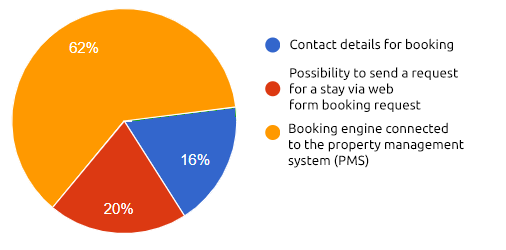Digital marketing is booming. Internet penetration in Slovakia is up to 85 percent, as reported in the Reuters Institute Digital News Report 2018. This means that everyone is indeed reachable in the digital sphere these days. Maybe it’s not on a laptop or computer, but rather the high number of smartphone users seen in recent years.
And how have hoteliers been reacting to this trend? Are they ready for digital marketing? A survey which took place in February and March of this year provides some initial perspective. 50 Slovak hotels ranging from 3 to 5 stars took part.

Structure of hotel survey category.
USERS ARE IMPATIENT
Every second it takes to load a website reduces the chances for a positive user experience. Simply put, as users we are all impatient. Over the past 10 years the time we’ve been willing to wait for the information we want has continued to decrease. In the case of making a reservation, immediate information about the availability and price of the hotel is crucial. Therefore, the use of a reservation system is a given for hotel websites nowadays. In this respect, it was good to note that up to 62 percent of hotels are using an online reservation system that is linked to the hotel’s PMS reception system.
It is this PMS system that provides instant information on availability. Other methods like sending a request and waiting for a confirmation of stay or contact details are already becoming a barrier.

If the client is lucky with a hotel’s reservation system, the hotelier then arrives at the classic dilemma: to allow or even require a credit card payment when booking. Thanks to reservation systems, card payment is a relatively easy to implement module. In the survey, up to 60 percent of hoteliers said they required a credit card as either mandatory for payment or reservations. Furthermore, 24 percent provide this on an optional basis.
DIGITAL MARKETING IN SLOVAK HOTELS
In addition to Internet penetration amongst the general population, digital marketing and its importance are also expressed by media investments in advertising. In some countries, investments in digital advertising have already exceeded the sum of investments into other forms of advertising such as TV, radio, print, and so on. Slovak hotels are lagging behind in this area, as up to 50 percent of hotels spend only 30 percent of their budget on digital advertising.

Structure of investment share of digital advertising compared to overall budget.
Digital advertising is not just a trend. It is very measurable and Slovak hoteliers have confirmed their awareness of such an advantage. Up to 76 percent of hoteliers evaluate the number of bookings, while 82 percent regularly monitor website traffic. But calculating the return on investment for each ad source and linking it to the origin of the reservation is already challenging, and only 22 percent of respondents attempt to do so.
The complexity of the digital ecosystem requires expertise and practical experience, which is likely to be found only with specialized digital marketing agencies. This is confirmed by the research, as up to 24 percent of hotels use an agency. 40% of these are an accumulation of different functions, while 36% are marketing specialists. Today’s digital marketing era, which is constantly changing, requires close specialization – either from an internal marketing officer or in combination with an external specialist agency.

SOCIAL NETWORKS DOMINATE
Digital marketing is clearly dominated by social networks. Up to 92 percent of hotels said they regularly post on Facebook, and 84 percent on Instagram. Only 76 percent of hotels are willing to pay for their campaigns on social networks. Given the trends that suggest that visitors to external websites from Google or Facebook will be devalued (because these giants have long been trying to keep users on their websites), it’s interesting to recall the statement made by world-renowned expert Rand Fishkin, who said at SMX Munich that 10 relevant email contacts are worth more than 10,000 fans on a given social network.
Some context must be added to this statement. Mr. Fishkin did not mean email marketing at the level of a single email database, where someone decides it’s time to send an offer and it will be sent. Yet again, there is a need for sophistication and specialization. The database must be segmented. You don’t send a business offer to a family who has just stayed at the hotel. In addition to segmentation, personalization is needed, which is possible when integrating data from a booking system into CRM (Customer Relationship Management). In this case, the effectiveness of email marketing will be much more valuable to the hotel than from other marketing media that the hotel does not “own,” and where the hotel is fully dependent on the setup and changes of an algorithm which determines how much and in the future which users/fans, if any, will ever see the website/post without paying.
TRENDS INCLUDE AUTOMATION AND PERSONALIZATION
Thanks to the increased adoption of reservation systems, Slovak hoteliers have been able to meet the expectations of users. This will enable them to connect to digital marketing trends in the near future, which clearly include automation and personalization. These trends require continuous training for internal marketing staff, who should be able to communicate with advanced agencies using advanced statistics.
Slovak hotels are still slightly lagging in this area. Also, the ratio and amount of investment in digital advertising should increase. Up to 50 percent of hotels reported investing the amount of 250 euros per month, which is too little. This low investment in digital advertising and the low specialization of the marketing staff then adds to their dependence on Internet booking giants like Booking.com and OTAs. In the case, hoteliers are dependent on the not very loyal and creditworthy clientele of these discount portals.


